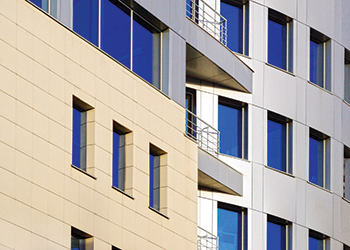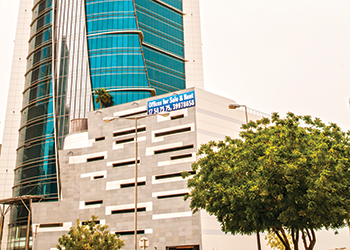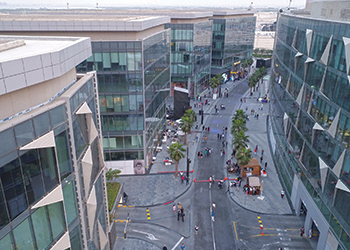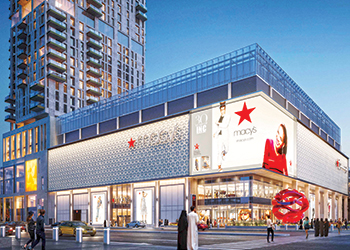
 Platinum Tower in Bahrain ... a Reynaers project.
Platinum Tower in Bahrain ... a Reynaers project.
Given that buildings are responsible for 40 per cent of the total carbon dioxide emissions (in the EU), sustainability is now on the top of the agenda of the construction industry, says Reynaers Aluminium, which has been focusing on making a genuine contribution to a new way of building.
The leading European aluminium systems provider is doing this through developing innovative products, continuous research, and focusing on knowledge exchange.
Erik Rasker, chief technology officer at Reynaers, says: “Energy-efficiency is one of the most important themes in all of the developments Reynaers has implemented in the last several years, and it is something the company is continually working on. For instance, much attention has been paid to the development of highly insulating windows, sliding doors, and curtain-walls which minimise the building’s energy loss.”
Through its regional office Reynaers Middle East, the company has contributed to the construction of highly energy efficient buildings such as the Swiss International School in the UAE executed utilising CW 50-HI (high insulation); Prince Khalid Building in Saudi Arabia, Dr Hazem Maher Tower in Egypt, Platinum Tower and Ashraf Building in Bahrain, which uses the CW 50-HL (horizontal lining); and QREIC office building in Qatar utilising CW 60-HL.
Reynaers is seeking ways to better regulate daylight. On the one hand, it is developing very slim profiles for large glass panes allowing more light to enter, meaning that less energy is required for lighting and heating; and on the other hand, its brise soleil systems keep the sun out when needed, thus reducing the cooling burden. It has already started working on energy-producing systems, and now offers façade and sun-screening systems that allow integration of solar panels.
That’s not all: Reynaers also invests in efforts to minimise the use of fossil fuels for its own use. In 2007, a total of 3,072 photovoltaic panels were built onto the roof of the new distribution centre at its Duffel headquarters in Belgium, producing over 550,000 kWh annually and reducing carbon dioxide emissions by 300 tonnes. This installation was expanded by 7,047 panels at the end of 2010, ultimately generating 80 per cent of the total energy needed.
It is evident, says Rasker, that Reynaers takes sustainable entrepreneurship seriously; the company subscribes to the corporate social responsibility (CSR) concept under the motto, ‘People, Planet, Profit’.
The word ‘people’ in the motto extends beyond customer service and user-friendliness to involve everything, from developing the simplest working mechanism for windows and doors to reducing the number of parts per project so as to minimise the risk of error. It also means encouraging social awareness among employees through an annual community day.
In terms of ‘planet’, the focus is on integrating energy-efficient technical innovations and architecture, such as the photovoltaic installation at Duffel. Another example is the development of high-quality insulating profiles and more aesthetically-pleasing ventilation systems, which are available to architects in nearly any size and colour.
The term ‘profit’ relates to the company’s financial health and continuity, necessary for research and development and the implementation of new, sustainable systems. Reynaers not only sells low energy systems, but also participates in various projects. For instance, the company is currently examining how the ‘Cradle to Cradle’ concept, by architect William McDonough and chemist Michael Braungart, could be implemented throughout the Reynaers Group.
In Reynaers’ systems, aluminium is a staple which, Rasker says, is a green material, thanks to its durability (75 per cent of the aluminium ever produced is still in use) and the 100 per cent recycling capacity.
“But it is what we at Reynaers Aluminium do with this material that illustrates our commitment to a sustainable future,” he remarks.
In order to promote aluminium recycling, Reynaers has recently started a project with its partner E-Max, a Belgian aluminium extruding company. Together, the two companies have documented the renovation of an old aluminium façade, the re-melting of the different elements, and finally the production of new profiles, which meet the latest thermal insulation requirements.
Finally, Reynaers has entered into a new partnership with the International Energy Agency (IEA) to develop a ‘Window Policy Pathway’, a brochure for governments about energy-efficiency and windows.
Reynaers Aluminium is a leading European specialist that manufactures and markets innovative and sustainable aluminium solutions for windows, doors, curtain-walls, sliding systems, sun-screening and conservatories.
Besides a wide range of standard solutions, the company also develops tailor-made solutions for all market sectors – from residential to commercial and industrial projects. Reynaers’ high-quality systems meet the most stringent demands in terms of comfort, security, architectural design, and energy-efficiency. It acts a valuable partner for architects, fabricators, solar installers, project developers, investors and end-users.





















_0001.jpg)


.jpg)
















.jpg)








.jpg)




